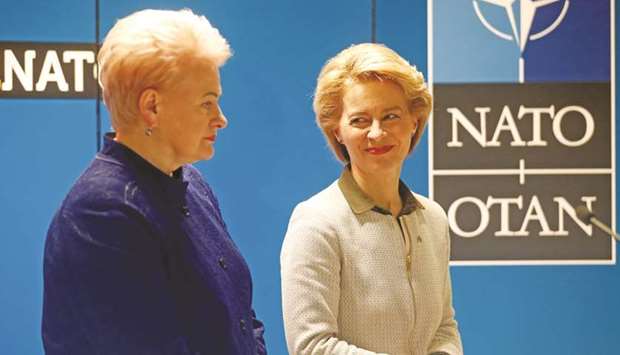Germany will invest a total of €110mn until 2021 in improving military bases in Lithuania, its defence minister said yesterday, underlining Berlin’s continued commitment to the defence of its Nato allies in the Baltic region.
Germany leads a Nato force of 1,200 troops from 10 countries sent to Lithuania two years ago as part of alliance’s effort to beef up defences along eastern Europe’s borders with Russia after its 2014 annexation of the Crimea region of Ukraine.
“We want to make clear that Lithuania is not alone and will never stand alone. It will never again have to sacrifice its freedom and independence,” Ursula von der Leyen told reporters during a visit to the German forces. “We will stay here with the Bundeswehr (German armed forces) as long as we’re needed, and as long as the security situation requires it.”
She said that the German deployment had bolstered joint training efforts and improved the ability to deploy on missions if needed.
Germany will invest €50mn this year in a joint barracks shared by Nato forces and in other facilities, with spending to total €110mn by 2021, von Der Leyen said.
Welcoming her comments, Lithuanian Defence Minister Raimundas Karoblis said: “This is the first time we have heard so clearly and from such a high political level that Germany is here for the long term, until the security situation changes.”
Lithuania, a former Soviet republic, joined the North Atlantic Treaty Organisation (Nato) along with the two other Baltic states – Latvia and Estonia – and a number of other ex-communist nations in 2004.
The three Baltic states, which were forcibly annexed by the Soviet Union in 1940 and secured their independence only with the fall of communism, were rattled by Russia’s annexation of Crimea and its support for pro-Moscow separatists in eastern Ukraine.
Von der Leyen also spoke on developments regarding the Intermediate-Range Nuclear Forces (INF) disarmament treaty.
She said that the debate over the treaty should not resort to arguments dating back to the Cold War.
“We are agreed in Nato that we cannot simply transfer the arguments of the 1970s and 1980s to today,” von der Leyen said. “We need new answers and new solutions.”
Over the weekend, the United States and Russia both announced their withdrawal from the INF, each accusing the other of violations.
The withdrawal period is six months, during which time the treaty can be salvaged.
Von der Leyen, member of German Chancellor Angela Merkel’s Christian Democrats (CDU), declined to take a position on a controversy within Germany’s broad coalition over how to approach termination of the INF.
Foreign Minister Heiko Maas of the Social Democrats (SPD) has come out strongly against stationing intermediate-range missiles in Europe, drawing criticism from CDU members, who are calling for all options to be left on the table.
The INF treaty was signed by the US and the Soviet Union in 1987 and ratified the following year.
As successor state to the Soviet Union, Russia took over the obligations relating to the INF, which eliminates land-based missiles with ranges between 500km and 5,500km.

Von der Leyen with Grybauskaite at the news conference in Lithuania’s Rukla military base.
